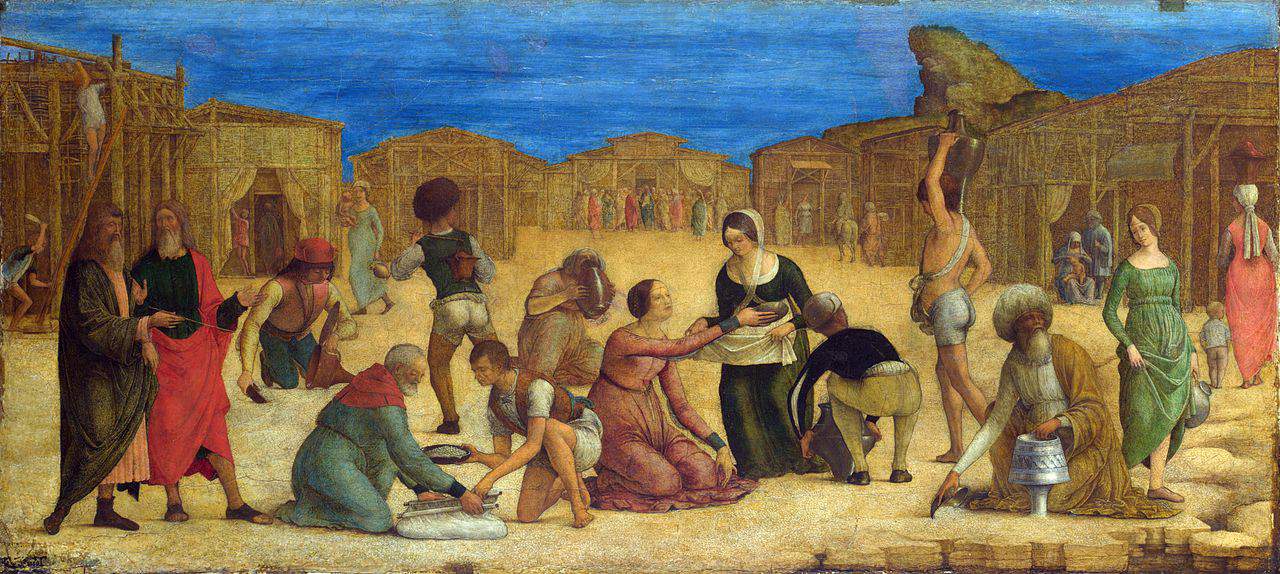
Image: The Israelites gathering Manna, Ercole de’ Roberti [public domain]
One of my favorite stories of the Old Testament is the story of the Exodus. I think it is because every aspect of it has parallels into our own lives. We are all at one time or another bound in slavery to something or someone or even an ideology that keeps us from being our true selves—a beloved child of God who serves the Lord in our baptismal calling of priest, prophet, and king. When we fall into sin, even venial, it can keep us enslaved, separating us from or impairing our relationship with our true love, our Lord God and keeping us from our baptismal mission—or at least impeding it.
In response, God always seeks us out in our slavery to free us and restore our union with Him. We see this all over the Scriptures, where God is always first in seeking to restore broken covenants after His people fall into sin and break the covenant: Adam and Eve, David with Bathsheba, the Prodigal Son, etc. God is the greatest of Fathers who not only wants relationship with us, but for us to thrive in that relationship. He offers us an abundance of graces that flow forth from His Son, Jesus, to rescue us from our slavery and to sustain us in this journey where one day, by His grace, we will be united with Him forever.
We see this great work of God and His faithfulness in the Exodus story. God has freed His people by His mighty hand. He breaks the bonds of Pharoah, at the same time enriching His people with great wealth to prepare them for future mission, and sends them away from the place of their captivity, Egypt. I am sure that you remember the story—they are pursued by their former captors and God delivers them permanently from Pharoah and the Egyptians by washing their enemies away in the Red Sea where “…not so much as one of them remained” (Exodus 14:28 RSVCE).
This moment is of indescribable importance: the true freeing of the Israelites from captivity, freeing them to embark on their mission in being God’s firstborn son (see Exodus 4:22-23) and serving Him by being the priests of the world, bringing all nations to Him. This is what Israel is chosen to be, “a kingdom of priests, a holy nation” (see Exodus 19:5-6). But the Israelites have a more basic need that must be met before they can fulfill their vocation. They must eat!
I don’t know about you, but I really don’t get much accomplished if I don’t eat. Fasting has always been a challenge for me, but always worth it when I commit to it. Some of the unpleasant side effects with me are I get a little bit grumpy (my wife will tell you more than a little bit) and I am just not as productive in my mission. So think about the Israelites. They have just been freed through the waters of the Red Sea and now they find themselves in a desert lacking food and water. God has freed them to do their mission, but they are still in desperate need for God to provide. Which, as you read in the Scriptures, God always does!
In this case, we find that God not only provides, but He also provides abundantly beyond all expectation. The people are hungry, and God feeds them. The people, however, are not exactly expecting what God provides. When bread from heaven begins to fall, the people have a natural reaction to it. They say in the Hebrew man hu (Exodus 16:15), spelled out in the English as “manna.” This means, “What is it?” It is something beyond anything they could comprehend or imagine. Moses explains to them, “It is the bread which the Lord has given you to eat” (Exodus 16:15-16).
God has freed his people, he has fed his people, and now the people are truly free to serve Him. Next week we will take a look at how God frees and feeds us for our mission to serve Him.

